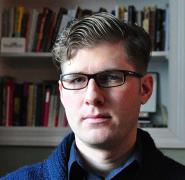Richard Ocejo, John Jay College of Criminal Justice – Are Low Status Jobs Cool?
 Is our view of culture shifting?
Is our view of culture shifting?
Richard Ocejo, associate professor of sociology at the John Jay College of Criminal Justice, looks into this question.
I am an associate professor of sociology at John Jay College, and also a member of the doctoral faculty in sociology at the Graduate Center. My forthcoming book, Masters of Craft: Old Jobs in the New Urban Economy (Princeton University Press; spring 2017), is about the transformation of low-status occupations into “cool,” cultural taste-making jobs (cocktail bartenders, craft distillers, upscale men’s barbers, and whole animal butchers). My first book, Upscaling Downtown: From Bowery Saloons to Cocktail Bars in New York City, about nightlife and conflict in gentrified neighborhoods, was also published by Princeton University Press in 2014. My work has appeared in City & Community, Poetics, Ethnography, and the European Journal of Cultural Studies. I am also the editor of Ethnography and the City: Readings on Doing Urban Fieldwork (Routledge; 2012) and serve on the editorical boards of the journals Metropolitics, Work and Occupations, and the Journal for Undergraduate Ethnography. I am currently working on two research projects: one on the development, design, and social dynamics of Penn Station and the other on small town gentrification in the Hudson Valley, NY. My overall research and teaching interests include urban and cultural sociology, community studies, work and occupations, and research methods (especially qualitative methods).
Are Low Status Jobs Cool?
Low-status jobs have become “cool” in this day and age. Hanging out in retro cocktail bars and upscale men’s barbershops, working in craft distilleries and in whole-animal butcher shops. What draws young workers and owners to service and manual labor jobs and businesses despite other work options? These and other blue-collar jobs have become popular in cities, with these businesses opening up in hip neighborhoods all across the country.
What explains why bartending, distilling, barbering, and butchery have become popular careers for college graduates? There are three big factors. First are changes in how people rank culture. What used to be considered “highbrow” and “lowbrow” is now very different, so we’re seeing common items and services like whiskey, haircuts, and unusual cuts of meat become more exclusive when made in certain ways.
Second, gentrification brings new businesses that cater to the tastes of young professionals as consumer experiences have become important to city life. The businesses studied all fit the bill of community staples that offer unique products and services for culturally savvy urbanites.
And third, we’re seeing how valuable jobs that allow workers to be creative have become. Usually this means knowledge work of some sort, but also jobs that combine knowledge with craft, or using your hands to make or do something special. So these versions of these common occupations allow workers to be creative, to know and make things that have become valuable, and to work in cool consumer destinations.
In my research, I show how these jobs are more than just “cool,” but possible careers that bring great meaning and social benefits for workers. While they are unlikely alternatives to quality office jobs, they remain exclusive and difficult for many people to obtain.


